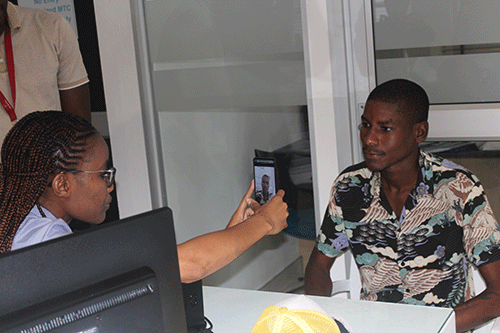The country’s biggest telecommunications company, MTC, yesterday clarified that gathering customers’ biometric information during SIM card registration should not cause concern.
According to the company, it has gone the extra mile to ensure data security and pledged it would never use the gathered information for any other purpose than curbing cybercrime.
The mobile telecommunications company has been scanning customers’ fingerprints and taking face photos during the mandatory SIM registration process.
However, some community members feel a certified copy of either an ID or passport should suffice.
“The information that we obtain from customers will always be handled with the utmost privacy that it deserves. We are not sharing any customer information with a third party or institution unless that customer consents,” pledged MTC’s Tim Ekandjo yesterday.
He added that various countries have already implemented biometrics as part of SIM registration, including Ghana, Lesotho, Tanzania and now SA.
“We are all realising that simply having the customers’ ID and address is not enough. With biometrics, we have now safeguarded your identity digitally and nobody will be able to replicate it. That is why we are doing it – not for any other things,” detailed Ekandjo.
He added that MTC has made biometric data a condition of service and that if, for whatever reason, a subscriber does not want to have their pictures or fingerprints taken, their services will be indefinitely suspended.
“If you decide not to go through the entire SIM Verifi system, you will, unfortunately, by deadline day, not be able to do business with us,” said Ekandjo.
Customers using false identity documents have defrauded MTC in the past.
Ekandjo said since the implementation of the Verifi system, the company has reduced fraudulent activities by 80%.
Verifi, therefore, covers the basic SIM registration requirements and goes further to obtain biometric data from customers.
Ekandjo said the most common crimes include online scams (phishing), digital extortion, business email compromise, ransomware (malware designed to deny user access to company documents) and botnets (compromised machines used to automate large-scale campaigns).
Ekandjo added: “We have been in this business for 27 years, and we have never had any instance of a leak of a customer’s confidential information. We are operating this in terms of the draft Namibia Data Protection Bill, which adheres to the GDPR (General Data Protection Regulation)”.
Mandatory SIM registration is in preparation for protecting digital identities from cybercrime.
This exercise also aims to ensure effective regulation of a technological landscape that significantly benefits society, the economy and Namibia’s governance.
To date, MTC has registered 969 235 of the 2.7 million subscribers. The team said they are aggressively working towards registering the remaining customers before the year ends.
“There is nothing illegal about this. There is nothing in the law that prohibits this from happening. What the regulator was saying is that SIM registration does not require biometrics. We have just gone a bit further to protect you and us,” said MTC’s legal, compliance and risk officer Patience Kanalelo.
She explained that facial recognition and thumbprints are an extension of an already-known process but argued all this information is the same.
“We (MTC) have been gathering your IDs. Banks also have them, so this is not private anymore. When travelling, home affairs has your biometrics. This is stored in a secured cloud. The laws do protect you that these cannot be shared unless you agreed to them. It’s not new for us to store your personal information. We have been doing it for 27 years,” said Kanalelo.
– psiririka@nepc.com.na


